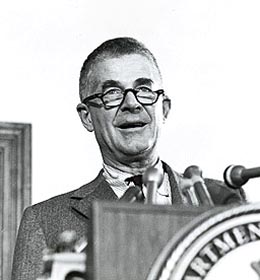From September 24 to October 2, 1982, civic activists try to stimulate a dialogue on doomsday with "Target Seattle," a week-long symposium on the dangers of nuclear war, in what Mayor Charles Royer calls "a typically Seattle approach to a typically Seattle problem."
Target Seattle
The symposium was co-sponsored by about 60 different groups and coordinated by the Metrocenter Branch of the Young Men’s Christian Association (YMCA). It included a series of workshops and lectures by nationally prominent speakers, including pollster Louis Harris; David Brower (1912-2000), founder of Friends of the Earth; Dr. Jonas Salk (1914-1995), developer of the Salk polio vaccine; Dr. John E. Mack (1929-2004), Harvard Medical School psychiatry professor and Pulitzer Prize-winning author, and Richard Lyman, president of the Rockefeller Foundation and former president of Stanford University.
About 10,000 people attended the closing ceremony, held in the Kingdome (the King County Multipurpose Domed Stadium, since demolished) and featuring a speech by Archibald Cox (1912-2004), national chairman of Common Cause. A Harvard law professor and former U.S. solicitor general, Cox became a national symbol of personal integrity when he was fired as Watergate special prosecutor by then-President Richard Nixon during the so-called “Saturday night massacre” in 1973.
The organizers of Target Seattle came largely from the city’s liberal professional elite. Among them were Paul Schell (1937-2014), then president of the Cornerstone Development Company (later mayor of Seattle); Walter Straley, former president of Pacific Northwest Bell; Dr. Hugh Straley, a cancer specialist; Kay Bullitt, director of the Municipal League; Dr. Judith Lipton, president of Washington Physicians for Social Responsibility; and Rainer Miedel, Seattle Symphony conductor.
Critics complained that although the event was intended to bring together people of diverse opinions, it ended up favoring liberal perspectives. “The subjects selected for the workshops and seminars appear to have been skewed to imitate the ‘scare ‘em to death’ routine now being followed by the anti-nuke activists,” Robert Rudolph of Olympia, Washington, wrote in a letter to the editor of The Seattle Times. Aldon Bell, a University of Washington professor and chairman of Target Seattle’s executive committee, countered that representatives of the “balance of power” and other conservative strategies had been invited to present their views but had declined.

